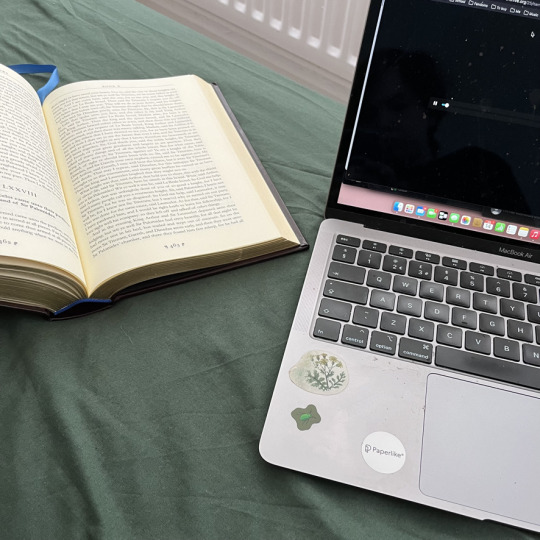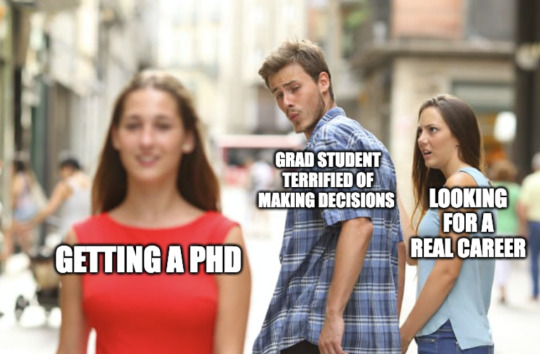#student dissertation
Explore tagged Tumblr posts
Text
Hello everyone!
My name is Amina and I am a BSc Psychology with Honours student at the University of Hertfordshire. I am also the principal researcher of a study that aims to investigate whether judging category relatedness within semantic memory can be influenced by the level of typicality the items have alongside whether high versus low autistic traits have any effect on the performance of different types of processing.
I am currently taking volunteers for this online study. Any adults aged 18 to 65 can volunteer and you do not need an official Autism diagnosis to take part.
In the study, you will be given an item/ definition/ scenario at the top of your screen and will have to decide which of two following words match best to that using your keyboard. After that is completed you will be given the RAADS-14 questionnaire to complete.
It will take roughly 15 minutes to complete. However, a maximum of 30 minutes is given for the entire study to be completed including the information sheet, consent form, debrief sheet, and the “breaks” given (which are just for momentarily resting your eyes and hands), otherwise I cannot use your data. Please note that this study cannot be completed on a mobile phone or tablet, it must be done on a computer/laptop as the keyboard is required for the study’s completion.
You can completed this study at anytime until 23:59 GMT on Friday 1st of March here:
https://research.sc/participant/login/dynamic/0D915D45-8D85-44F9-9B63-376AF0C70573
This study has been approved by the Ethics Committee at the University of Hertfordshire and is also being conducted under the supervision of Dr. Nicholas Shipp.
Your participation is very important for this study and is very much appreciated.
Thank you for your time!
Many Thanks
Amina
EDIT: Study is now no longer taking participants!!! Thank you all who took part and spread the word of my study, it definitely means a lot to me 💟
#autistic traits#conceptual processing#typicality#processing#mental processing#autism spectrum disorder#psychology study#psychology research#undergraduate#student dissertation
308 notes
·
View notes
Text
i feel like dream in human aus is usually characterized as being more stoic and stern while hob is more easygoing, but i think it would be funny to have a university au where hob is the professor who's like "no work is deserving of 100%. find 27 more sources and do it again" while dream is just like "they put their dreams into it, hob 🥺 A+! A+! A+! A+!"
#hob: you got this date wrong in the paper. c-#dream: i like all the misspelled words. really adds personality to the story. A+#hob is the ideal teacher for students whove always gotten good grades easily and need someone to challenge them more#dream is the ideal professor for students who struggle with self confidence and need to feel more capable#hob should only teach 400 level senior classes. dream teaches Intro to Poetry 😂#one time they swap papers to grade and then hob's like 'dream why did you give all my students As' dream's like 'they tried their best 🥺'#hob's like THEYRE HISTORY MAJORS DOING THEIR DISSERTATION AND YOU LET ONE OF THEM SPELL HATE AS 'H8'#dream: why'd you give my students Bs :(. hob: one of them turned in a coffee stain as a poem? wth#dream: everything is poetry hob. it's abstract. oh my god you dont get it at all 🙄#dream's unconventional method does work tho. he has an uncanny ability to get even the most disengaged students to care SOMUCH about poetry
504 notes
·
View notes
Text


days of october 🍂
aka coffee, daily walks and never-ending thesis work
#aquietplacetostudy#light academia#studyblr#aesthetic#study inspiration#uni student#writing#university#uni life#study blog#thesis#master thesis#dissertation#minimal study space#study space#academia#october#fall season#autumn
1K notes
·
View notes
Text

Dissertation prep is scary but exciting! I can’t believe I’m already having to start this; it feels like I started uni yesterday.
#studyblr#study#studying#studygram#study aesthetic#study space#studyinspo#studyspo#study tips#notes#dissertation#uni studyblr#uni student#uni stuff#uni studyspo#religious studies
312 notes
·
View notes
Note
Please do a whole post about phd applications, funding applications, fellowships, TAships etc. Would love your take on it. Thanks
I'm chronically horrible at responding to asks, so this is coming later than you probably expected!
For context, I'm now a second year PhD art history student about to take her doctoral (comprehensive) exams in April. I applied for PhD programs during the last semester of my master's program, which was a terminal degree through a different university than the one I currently attend.
I applied to two PhD programs in the United States and two in the United Kingdom: the processes are different, particularly when it comes to funding. The former will automatically consider you for funding and it's expected, at least in the humanities, that they will grant you tuition remission and a stipend for at least four years (potentially more, depending on your particular program). It's also possible to win additional fellowships, either through your university or a third party. For example, I have departmental funding (ie. a stipend that I receive for being a Graduate Assistant) and an outside fellowship from my university's Graduate School. My department applied for that fellowship on my behalf before I even enrolled. The other American university to which I applied also offered me tuition remission and a stipend, but it was less than the university I currently attend.
Two general notes about funding in the United States: (1) it often changes to account for rising cost of living but that does not necessarily mean you will be making a living wage, and (2) it often changes depending on whether your school has a Union. Graduate workers at my university are currently working to unionize, which would not only guarantee a living wage for union members but also offer protections for international students and student parents. There are a lot of benefits but the TLDR for funding is that unionizing often means the difference between $28,000 and $45,000 yearly stipend (see this article from the Boston Herald about BU's graduate student union). Graduate Assistants are often not allowed to hold a second job outside of the university and it's also difficult to do so when you are (a) working, (b) completing coursework, and (c) independently researching. My museum fellowship, which I'm due to begin in a couple days, jeopardized my funding status and I had to fight my university for them not to take away my fellowship. It ultimately worked out because I had my department chair's support but not all students are similarly supported—and not all departments are willing to advocate for their students.
Pivoting to UK schools: the TLDR is that they offer very little funding for international students and the funding that is available, either through the institutions themselves or outside organizations, is often not enough to cover the cost of living. Tuition is largely cheaper than in America but the difference was not significant enough for it to factor into my decision. If you're interested in more detail, I'd recommend reaching out to @therepublicofletters who actually attends a UK institution. She can also tell you more about how their programs are structured. Unlike American PhD programs—which involve at least two years of coursework, doctoral exams, and graduate assistantships before defending your prospectus and beginning dissertation research—UK programs ask you to apply with a prospectus that you will use as the basis for dissertation research that you begin immediately upon entry. The difference is that American programs typically take 5-7 years to complete whereas UK ones are only 3-4 years. While this may seem convenient in the short term, I was advised that American institutions (museums, universities, etc) often prefer PhDs from American institutions because of the extra work completed.
Setting aside this technical information, I chose the four programs to which I applied based on vibes. I had a master list of schools and advisors and I contacted each one to see if we fit in terms of academic interests and personalities. I did not want to work with an advisor I didn't like and who didn't like me—or who had so many students that they had no time for me. Aside from speaking with them personally, I also reached out to their current advisees: students will often give you a more honest perspective on faculty and the department as a whole. I would almost lend more weight to what the students say than any of the professors because they are and/or will be your peers. They are also the people who will give you the most honest information about how professors and the department view students of color, women, queer students, etc. Art history and the humanities are fairly white, straight, and male dominated, so it's important to get a read on how non-normative (for lack of a better collective term) individuals are treated. I used this information to narrow down my master list to four schools, each of which I would be happy to attend. Whether I was admitted to one or to all four, I would have a place to go where I would be content and able to find community.
This is a personal note but something to consider when it comes to advisors is gender. That should not be a determining factor but I realized after committing to my current school that this is the first time I've worked with a male advisor. I love him dearly and he is one of the most encouraging scholars I have met but there have been occasions where there is a disconnect based on life experience. That said, I know many people who have had no issues at all!
Throughout this whole process, the name value of the schools was functionally irrelevant. In my experience—and that of the numerous individuals who advised me during the application process—your advisor is far more important than your school. While this will necessarily vary by discipline, you want to work with someone who has connections and/or knows how to network. For example, an older scholar will likely know everyone and their mother whereas a younger scholar will know fewer people but likely be more present at conferences, etc.
In the end, what matters most is your happiness and stability. Will you like working with your chosen advisor? Will you like taking classes in other disciplines within your department? Will you be able to make friends and/or have civil relationships with other graduate students (ie. will people steal books you need because they know you need them, like at Columbia)? Can you afford to live in whatever city in which you school is located? Are they paying you a living wage and/or offering you alternate opportunities to apply for funding?
I chose my school based on the graduate community, my advisors (I now have two), and the funding package. There have been incidental issues that I could not have anticipated, but on the whole, I do not regret my decision because I prioritized my happiness when I was applying and did not make decisions based on what I thought other people would want. This is a huge commitment and you need to be self-motivated, to rely on your love of the subject, to make it through the hard times.
My last bit of advice, which I received from my undergraduate advisor: don't go into debt for art history! If a program isn't paying you and/or isn't paying you enough, then they're not worth your time. Know your worth and ask for what you deserve, never be afraid to negotiate funding.
Let me know if y'all have any other questions! This was a long one but I hope it was helpful.
#art history#history#phd research#phd life#phdblr#phd student#phdjourney#higher education#university#student#student life#studying#studyblr#art study#study motivation#application#funding#phd thesis#dissertation#school#college#academics#dark academia#light academia#art academia#academia aesthetic#chaotic academia#am still on my bullshit about women#historical women
30 notes
·
View notes
Text


Still proofreading…
#studyblr#student#dark academia#studygram#dark academia aesthetic#theologystudent#academia#theology#student blog#dissertation#phd research
80 notes
·
View notes
Text
I’m struggling
/silly

Mini announcement
There’s probably going to be less posts? I dunno for sure, most likely will be posting old art or some sketches
Currently concentrated on finishing writing and drawing my diploma project, so need some time to get over with it 💪
#final year of uni go brrrr#*aggresively sips even more coffee*#beatline tm munched on my thesis#bet it didn’t even taste good#academy memes#bachelors degree#student#student memes#student life#student struggles#student stress#art memes#memes#funny memes#dissertation#thesis#university#university struggles#university stuff#life struggles#art struggles#bachelor#bachelor memes#bachelor degree#academic stuff
179 notes
·
View notes
Text

i have wanted to read something other than philosophy for a while, but today is not that day.
#bookstagram#literature#bookish#books & libraries#philosophy#philosophy student#dissertation#college#coffee#coffee daily
57 notes
·
View notes
Text
I don’t think there is anything more heartbreaking than watching freedom and peace being taken away in the most inhumane and barbaric way to those who, to the very least, deserve it. This feeling did not change in the years becoming aware of what is happening to Palestinians and my hope for humanity is slowly dissolving into bitterness. This is the cruelty of being empathetic watching terror unfold.
But what I find most comforting are the promises that keep me going:
وَلَا تَحْسَبَنَّ ٱللَّهَ غَـٰفِلًا عَمَّا يَعْمَلُ ٱلظَّـٰلِمُونَ ۚ إِنَّمَا يُؤَخِّرُهُمْ لِيَوْمٍۢ تَشْخَصُ فِيهِ ٱلْأَبْصَـٰرُ ٤٢
Do not think ˹O Prophet˺ that Allah is unaware of what the wrongdoers do. He only delays them until a Day when ˹their˺ eyes will stare in horror—
Qur’an 14:42
وَسَيَعْلَمُ الَّذِينَ ظَلَمُوا أَيَّ مُنقَلَبٍ يَنقَلِبُونَ
And the wrongdoers will soon know at what final place they will end up.
(Sūrat al-Shu‘arā, No 26, Āyat 227)
#mindofserenity#I remember writing about this conflict when I was a student for my dissertation and the compassion I carried remains with me to this day.#It can be draining to have an empathetic heart.#freedomisntfree#palestine
155 notes
·
View notes
Text
Understanding the Types of Literature Review: A Comprehensive Guide
Understanding types of literature review: A comprehensive guide.
Literature reviews are critical components of academic research that give an overview of the available knowledge relating to a particular topic. This helps to identify gaps, forms a basis for further research, and grounds the study on established theory and evidence. Literature reviews, however, do not fit in one single type. Rather they are of different types. Each depends on the purpose and approach of the research. Let's have a detailed view of the types of literature reviews. ### 1. Narrative Review
A narrative review, sometimes known as the traditional one, gives a general overview of research regarding a particular topic. It is descriptive and focuses on summarizing and synthesizing findings without much depth analysis.
Key Features:
Focuses on storytelling and descriptive summary. - Majorly used in fields such as humanities and social sciences.
Lacks a systematic methodology for selecting studies, which can lead to bias.
Purpose:
Narrative reviews are ideal for understanding a topic broadly and identifying general trends or patterns in the literature.
2. Systematic Review
A systematic review is a rigorous and structured approach to synthesizing research. It follows a predefined protocol to ensure transparency, reproducibility, and comprehensiveness.
Key Features:
Has explicit inclusion and exclusion criteria.
Is planned in databases systematically to find studies.
Keeps bias at a minimum by having a clear methodology.
Purpose:
Systematic reviews are applied to answer particular research questions, especially in fields like healthcare, psychology, and social sciences. Systematic reviews come with immense value because of their reliability and objectivity.
3. Meta-Analysis
A meta-analysis is a type of systematic review that pools data from many studies together using statistical methods to make their own synthesis, which tries to produce a quantitative overview of research findings.
Key Features:
Assumes all studies share similarities in methodology to compare them. - Offers results with statistical significance by combining data. - Is considered a demanding statistical process.
Meta-analyses are commonly used in medicine and psychology to determine the effectiveness of interventions or treatments. ***
4. Scoping Review
Scoping reviews are exploratory and aim to map the breadth and scope of research on a topic. Less focused on answering specific questions and more on identifying research gaps, they are considered exploratory. #### Key Features:
Wide inclusion criteria, casting a net to encompass all aspects of a topic. Does not critically evaluate the quality of included studies in depth. Often a precursor to a systematic review. #### Purpose:
Scoping reviews are suitable for nascent research areas or subjects where there are a few published studies to date.
5. Integrative Review
An integrative review combines qualitative and quantitative research to achieve a holistic understanding of the topic under review. * Key Features:
It integrates data based on diverse methodologies.
This integration encourages innovation.
It is useful in the development of theories or models * Purpose:
It is common to find such reviews in nursing, education, and healthcare research where mixed methods are often employed.
6. Critical Review
A critical review evaluates and critiques existing literature, often proposing new frameworks or perspectives.
Key Features:
Involves in-depth analysis and interpretation.
Challenges existing assumptions or theories.
Requires a strong theoretical foundation.
Purpose:
Critical reviews are ideal for advanced academic writing, such as dissertations and theoretical papers.
7. Theoretical Review
Theoretical reviews focus on examining theories related to a topic rather than empirical research.
Key Features:
Compares and contrasts different theoretical frameworks.
Identifies theoretical gaps.
Explores the evolution of ideas over time.
Purpose:
These reviews are often used in disciplines like sociology, philosophy, and psychology to refine or propose theoretical models.
8. Annotated Bibliography
A much simpler form of literature review is the annotated bibliography-an overview and critique of each source.
Key Features:
Lists sources with brief descriptions and critiques. Not synthesizing findings from the studies. Serves as a precursor to further developed reviews.
Purpose:
This type is commonly used for coursework or preliminary research to organize sources.
Conclusion
Each type of literature review has a specific purpose and is appropriate for a range of research objectives. Whether the use is about embracing broad trends in a narrative review or diving deep in statistical relationships as in meta-analysis, awareness of the types can guide you towards choosing the right approach for your study. The right type chosen ensures that your research not only becomes more robust but also relevant and impactful in its field. Mastering the art of literature review will keep researchers conversing effectively in the academic arenas while paving a way to make further discoveries.
Need expert guidance for your PhD, Master’s thesis, or research writing journey? Click the link below to access resources and support tailored to help you excel every step of the way. Unlock your full research potential today!

Follow us on Instagram: https://www.instagram.com/writebing/
#dissertation#phd student#thesis#phd life#grad school#phd research#exams#writingcitation#research#literature academia#english literature#literature quotes
11 notes
·
View notes
Text
Hello everyone!
I currently have a study for my psychology undergraduate degree. The study takes about 15 minutes to complete.
Here's a brief description:
Judging category relatedness within semantic memory can be influenced by the level of typicality the items have and autistic traits. The purpose of this study is to understand whether performance on multiple categorization tasks is affected by autistic traits. You don't need a diagnosis to take part. The only requirement is to be in the age range 18 to 65.
Do keep in mind this study cannot be completed on mobile phones, it must be done on a computer/laptop as the keyboard is required for completion. Also, the study has built in breaks but the maximum amount of time you can spend on this is 30 minutes and if you exceed this time I won’t be able to use your results.
#psychology#psychology research#conceptual processing#autistic traits#student#university#dissertation#student dissertation#study#experiment#college#college student#college studies#university student
5 notes
·
View notes
Text


Day 14 of 31 days until Dissertation Deadline
Another chore day! Welcome to the endless cycle of life!
I danced too much while doing chores today so I'm in pain, but that's my life, I guess.
Today I:
Put my washing in.
Cleared my room of trash (including the many bottles and cans of Diet Coke I accumulate as they wait for recycling day).
Washed up all my dishes so I can start afresh tomorrow.
Finished 'Book 10' of Le Morte d'Arthur and read the entire of 'Book 11'.
Caught a coelacanth in Animal Crossing. This equally as important as yesterday's golden trout but less remarkable since I did use bait.
FaceTimed my bio parent. I got to see the cats - cat time is the most important part of weekly parent FaceTimes.
So a decent amount. Which is nice to see.
See you tomorrow!
#studyblr#undergraduate#student#100 days of productivity#studyspo#university#dissertation#le morte d'arthur#chores
43 notes
·
View notes
Text


11/17/24
worked on my thesis and did homework for english and modern architecture!
#studyblr#books & libraries#college#literature#architecture#studyspiration#studygram#study blog#studyspo#dissertation#thesis#writers#study#student#school#library
14 notes
·
View notes
Text




I had a really wonderful January despite being very busy with uni work! We celebrated me and my girlfriend’s anniversary with a lovely meal and a trip away, and i had the best time with my favourite person ever.
Lots of dissertation editing at the moment while waiting for my new semester to begin next week! I’ve applied for a Masters programme so please keep your fingers crossed for me!
#studyblr#study#studying#studygram#study aesthetic#study space#studyinspo#studyspo#study tips#notes#gay#lgbtqia#uni studyspo#uni studyblr#uni student#dissertation
19 notes
·
View notes
Text

o shit its me
#jokes#funny#pls help#help me god#lol#shitpost#humor#distracted boyfriend meme#phd student#phd#phdblr#academics#stemblr#grad school#dissertation#university#phdjourney#phd life#crying into my ramen
139 notes
·
View notes
Text

the course head professor on his knees fucking begging students to show up for the classes they're paying 9k a year for- 😭
feel so bad for him cause we do be hating the generic modules we HAVE to attend in the final year but. i think this is about the younger students who are doing the FUN ground building work too.... Poor new course lead. He's doing his best on a sinking ship
show up to classes bitches it's education you're paying for. do you want the loan debt to go to your naps rather than education+?? absurd.
#core chatter#uni shit#University#dissertation#academics#dark academia#academia#chaotic academia#education#higher education#uni#student#student life#uni student#professors#professor#studentlife
10 notes
·
View notes